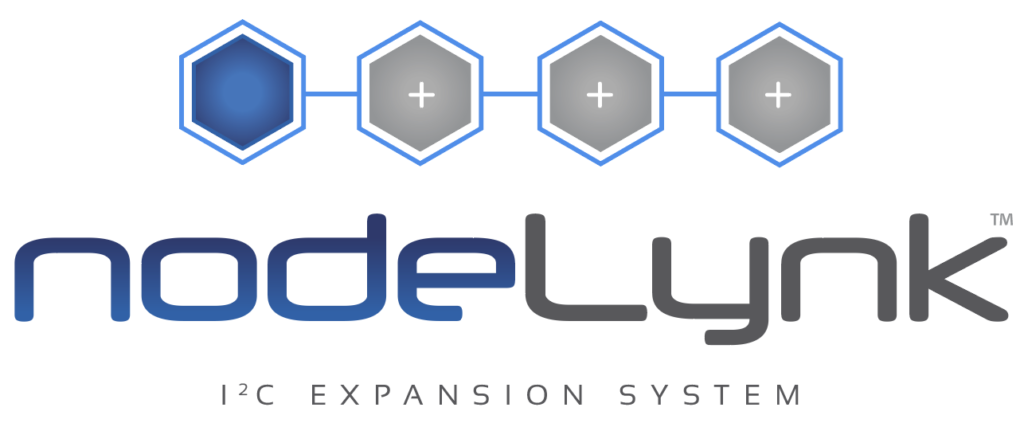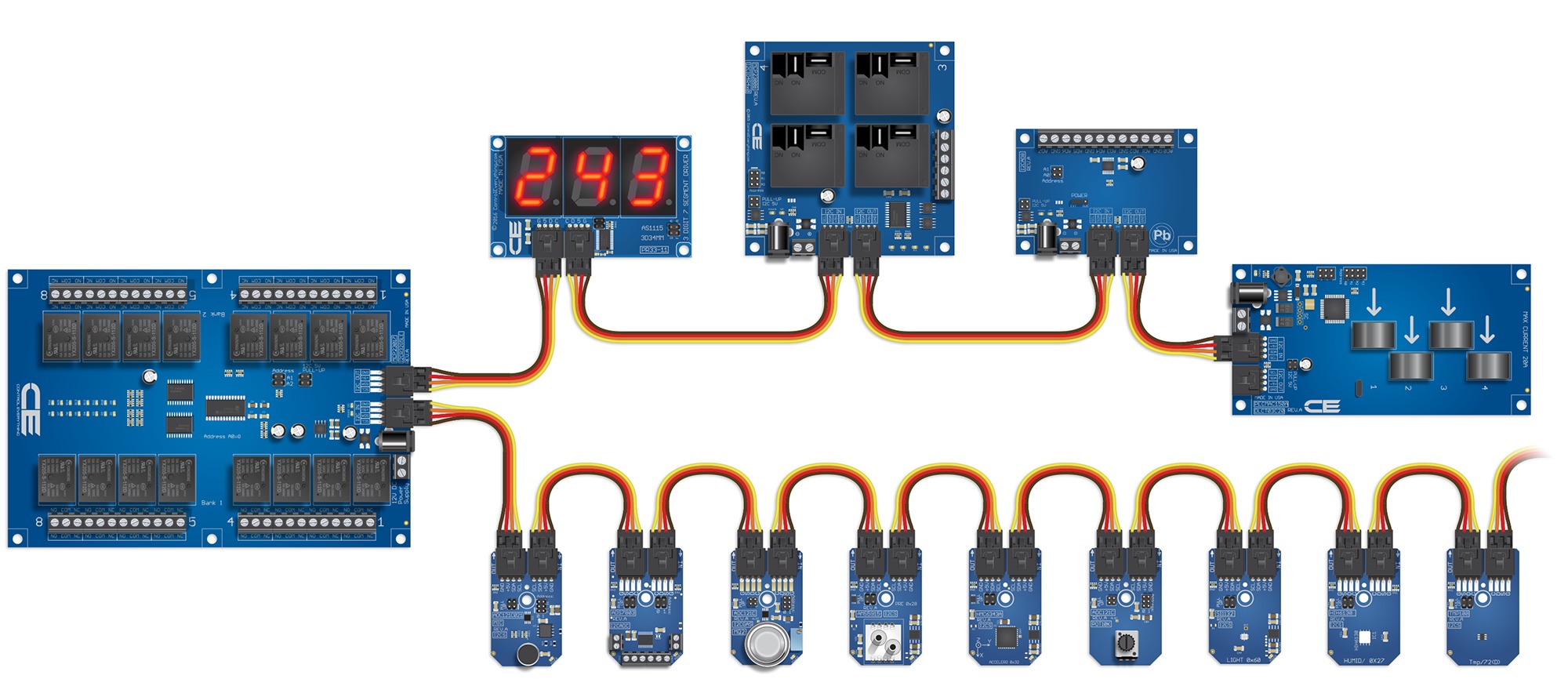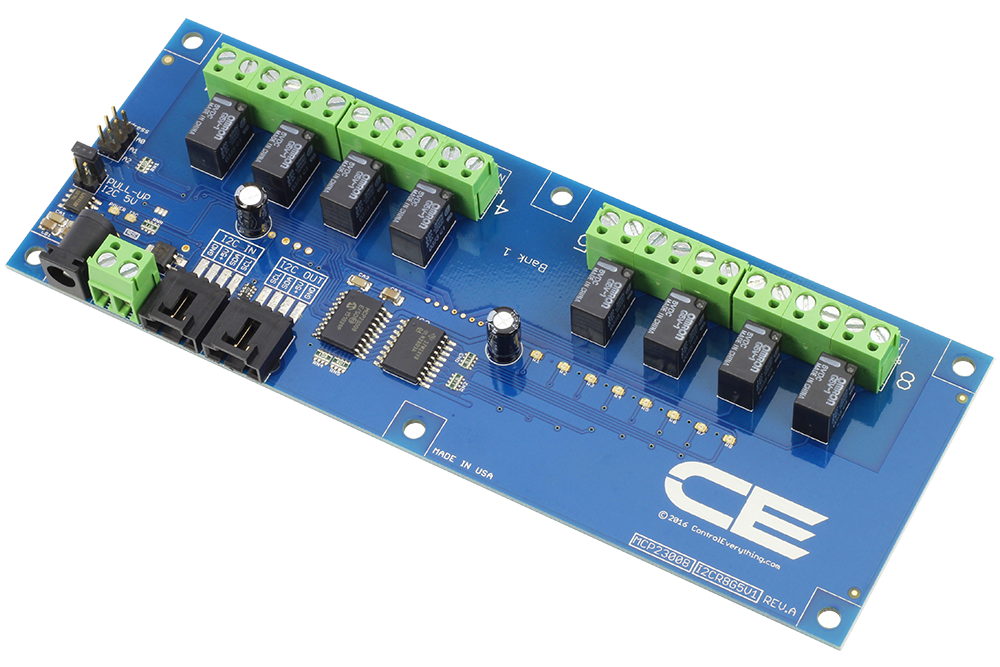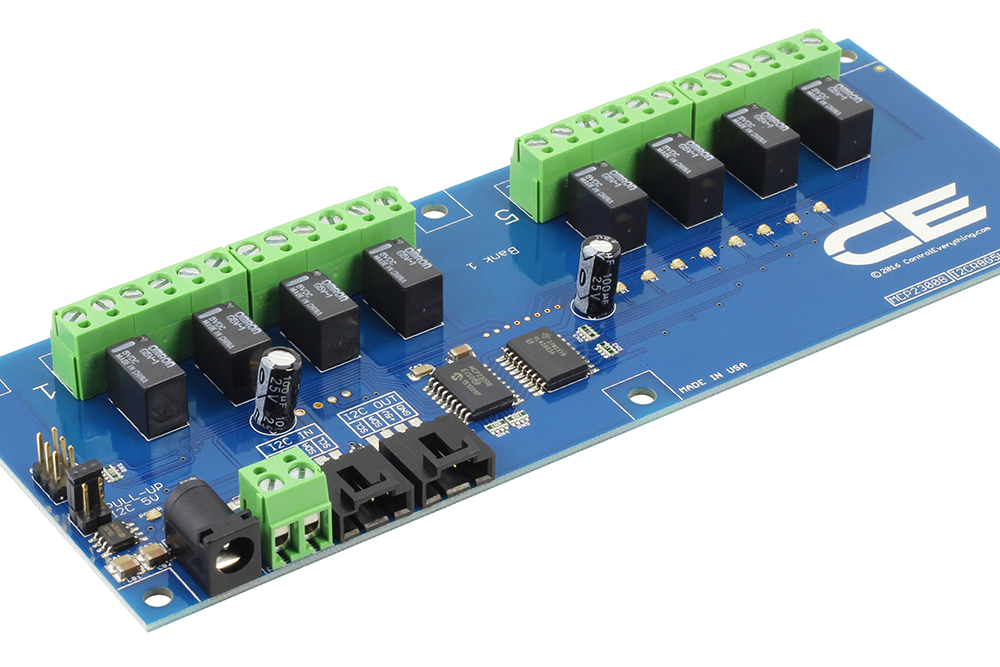8-Channel 1-Amp SPDT Signal Relay Controller with I2C Interface
Highlights
- 8-Channel SPDT Telecommunications Relay Controller
- Ideal for use with PC using Windows 8/10 via USB
- ESP8266 and USB I2C Interface Modules are Also Available
- Compatible with Arduino, Raspberry Pi, Onion, PyCom
- Switch Low-Power Signals up to 1 Amp at 12VDC or 120VAC
- MCP23008 I2C Controlled SPDT Low-Power Signal Relays
- I2C Output Port for Adding Sensors, Controllers, or More Relays
- Wireless Remote Operation with Key Fob Expansion Option
- Use the Arduino Wire Language to Control Relays using I2C Bus
- Example Libraries Available on GitHub
This I2C 8-channel low-power signal relay controller offers a cross-platform solution with unmatched compatibility and expansion capabilities. Compatible with every IoT technology that supports I2C communications, this is the most versatile relay controller we have ever manufactured. All NCD I2C relay controllers have a I2C output, allowing you to chain together more relay controllers, a vast array of sensors, current monitors, PWM drivers, and much more. The expansion abilities of this relay board are unmatched by any other manufacturer in the world. On-board SPDT relays are ideally suited for low-power signal switching applications, up to 1 Amp at 12VDC. NCD SPDT relay controllers have three connection terminals for user-access to each relay. We use high-quality Omron relays with a low on-resistance between contacts. Designed primarily for resistive or mildly capacitive low-power signals, the on-board relays in this design focus on signal integrity, making it an ideal choice for telecommunications and low-power audio switching applications.
This controller is based on the MCP23008, a common I2C interface chip for GPIO applications. In this design, the GPIO port is used to control the on-board SPDT relays. Three on-board address jumpers allow up to 8 similar devices (based on the MCP23008 or MCP23017) to be chained to the same I2C bus for individual control. On-board status LEDs display the on/off status of each relay. This controller may be powered using our optional power supply or with 12VDC and direct screw terminal connection of bare power wires. Each relay is accessible to the user via screw terminals, capable of accepting 14 AWG wire.

nodeLynk™ Device
This is a nodeLynk device, it will require a nodeLynk Master Adapter for proper operation. nodeLynk devices plug into Master microprocessors to easily add hardware sensing and control capabilities.
What is nodeLynk?
Chain expansion devices using nodeLynk. Connect a wide variety of accessories to expand the capabilities of a nodeLynk compatible controller. Use nodeLynk to add Relay Controllers, Sensors, PWM Drivers, Displays, and a wide variety of 4-20mA, 0-10V ADCs and DACs, as well as a wide array of TTL & Isolated GPIO devices. All nodeLynk devices use I2C communications to chain devices together. nodeLynk is an easy way to expand functionality without soldering. nodeLynk allows expansion in seconds so you can focus on your software and firmware development.

What is the nodeLynk I2C Interface?
NCD is the creator of plug and play modular hardware using nodeLynk, which is hardware I2C Interface connector standard. nodeLynk I2C devices allow you to chain together several devices on the I2C bus, and communicate to each device individually at high speed (subject to the limitations of I2C). The nodeLynk I2C Interface uses a standard 4-Pin I2C Input and I2C Output connector. nodeLynk I2C devices communicate 5V I2C data and provides 5V DC power through this connector. nodeLynk I2C devices use standard I2C communications for all data transport, which is supported by nearly every microcontroller in production today. The nodeLynk I2C Interface is strictly a 5V standard, which is ideal for transport across longer cables. nodeLynk I2C devices always include a 6″ (152mm) 4-conductor I2C cable. nodeLynk I2C Mini Modules always include a 3″ (76mm) 4-conductor I2C cable. Cables and connectors are available separately for designers who would like to include their own nodeLynk I2C Interface into their designs.
Plug and Play Connectivity
nodeLynk I2C devices will plug in to any available nodeLynk I2C Output. This includes just about everything we make in the NCD IoT Category, including all NCD IoT devices. We also manufacture a wide range of I2C adapters that make it easy to plug nodeLynk I2C Devices directly into most computing platforms. nodeLynk I2C Interface adapters are available for Arduino, Banana Pi, BeagleBone, Bluz, ESP8266, Onion Omega, Particle Photon and Electron, PyCom, Raspberry Pi, 2, 3, and Zero, and Windows. We are always working to add new platform support for nodeLynk I2C devices. nodeLynk I2C Interface devices are compatible with just about everything in the microcontroller industry.
Unlimited I2C Expansion
Based on our plug-and-play I2C interface standard, all nodeLynk I2C devices are equipped with a I2C output port, making it easy to expand to a wide variety of sensors, current monitors, relay controllers, PWM controllers, and much more! We are always designing new expansions for our modular plug-and-play I2C framework. We are dedicated to building a product line of interconnected devices to simplify all forms of automation. Re-use or upgrade your hardware in seconds by selecting the modules that best fit your needs, and chaining them together using the included I2C expansion cables!

A Raspberry Pi (above) is connected to a nodeLynk Master adapter. nodeLynk devices are chained to the Raspberry Pi nodeLynk Master using I2C communications. Each nodeLynk device must have a different I2C address for proper operation of the chain. Note that some nodeLynk I2C devices have a fixed address while others allow configuration of the address across a limited range of addresses.
Powering nodeLynk I2C Interface Devices
Some nodeLynk I2C devices require a external power supply, others may be powered through the 4-Pin I2C bus connector at 5VDC, and other devices are jumper selectable between external and I2C bus power. All I2C mini modules are powered through the 5V I2C bus connector, greatly simplifying connectivity.
1-Amp SPDT Signal Relay
This controller uses a 1-Amp small signal relay, allowing control of low-power telecommunications signals up to 12VDC at 1 Amp. Ideal for audio, telecommunications, and very low power switching applications. This relay has a low On resistance. The 1-Amp signal relay is of the SPDT variety, which provides Common (C), Normally Open (NO), and Normally Closed (NC) connections. Common is connected to NC when the relay is off. Common disconnects from NC and connects to NO when the relay is activated. All connections are made via screw terminals, capable of accepting up to 16 AWG wire.
Mechanical Drawing
Wiring Diagrams
Essential
Tutorials
- Controlling Inductive Devices: Managing Induction & Electromagnetic Interference
- Introduction to Computer Controlled Relays and Switching
- Relay Logic
Datasheets
Documentation Downloads
Community Repositories
Official Repository
Introduction to Relay Control
This video will guide you in determining which relay controller you need for your application as well as a general overview of the differences between Relay Options. If you’re new to our products or just need a refresher for a new application this is a great place to start.
Induction Suppression
Learn about Induction and how it comes into play with Relay Controllers. Induction suppression can make your Relay Control applications intermittent and unreliable. This video will show you what causes it, how to avoid it, and how to account for it in your application.
Integration Notes
All relays on this device are of the SPDT variety, providing 3 connections to each relay: Common, Normally Closed, and Normally Open. The Common connection is always connected to the Normally Closed connection when the relay is off. When the relay switches on, the Common connection is disconnected from the Normally Closed and Connected to the Normally Open. External loads may be wired to be off all the time and turn on when the relay turns on. Optionally, external loads may be wired to be on all the time, with the external load switching off when the relay is activated. Relays are rated at for Low-Power Signals up to 1 Amp at 12VDC or 120VAC. Relays are controlled using the MCP230xx Series Programmable GPIO Port Expanders from Microchip Technology. Relays are controlled by a MCP23008 using GPIO0:7. Controlling on-board relays is easy: Set GPIO0:7 as Digital Outputs. Next, set the on/off status of GPIO0:7 to activate the corresponding relays. LEDs indicate the status of on-board relays. All of these operations are handled for you when using the drivers supplied in our GitHub repository (ControlEverythingCom). Induction suppression capacitors are strongly advised for inductive switching applications (anything that generates a magnetic field). Induction suppression capacitors will prolong the life of the relays and help prevent malfunctions when switching high voltages.
I2C Interface Compatibility
NCD I2C Interface devices are designed to plug in to many popular IoT computing platforms. This allows the “brains” from other manufacturers to directly plug into our devices for easy plug-and-play operation. I2C interface devices use I²C as the underlying communications technology. The notes below will guide you into plugging 3rd party technologies into our devices, we will highlight any adapters that may be required in this section. Please note that all NCD I2C Interface Devices can be chained together to any other Cross-Platform I²C Slave Devices using the I²C Output. Additionally, NCD I2C devices may be plugged into the I2C Output of NCD IoT Interface devices. A complete list NCD I2C Interface adapters is available by clicking here.
Arduino Interface
- Plug this device into the Arduino Micro I2C Shield
- Plug this device into the Arduino Nano I2C Shield
- Plug this device into the Arduino Uno I2C Shield
- Plug this device into the Arduino Due I2C Shield
Banana Pi Interface
- Plug this device into the Banana Pi I2C Shield
BeagleBone Interface
- Plug this device into a BeagleBone I2C Shield
Bluz Bluetooth Interface
- Plug this device into the Bluz I2C Shield (with power)
C.H.I.P. Interface
- Plug this device into the C.H.I.P. I2C Shield
ESP8266 Interface
- Plug this device into the NodeMCU ESP8266 I2C Shield
- Plug this device into the Adafruit Huzzah ESP8266 I2C Shield
Particle Interface
- Plug this device into a Particle Photon WiFi I2C Shield
- Plug this device into a Particle Electron Cellular I2C Shield
Onion Omega 1 & 2 Interface
- Plug this device into a Onion Omega I2C Shield
PyCom Interface
- Plug this device into a PyCom WiPy, WiPy2, and LoPy I2C Shield
Raspberry Pi Interface
- Plug this device into a Raspberry Pi I²C Interface Adapter
- Plug this device into a Raspberry Pi 2/3 I²C Interface Adapter
- Plug this device into a Raspberry Pi Zero I²C Interface Adapter
Windows 8/10 PC USB Interface
- Plug this device into a USB to I2C Converter
- Plug this device into the BridgeX5 Series Controller


























